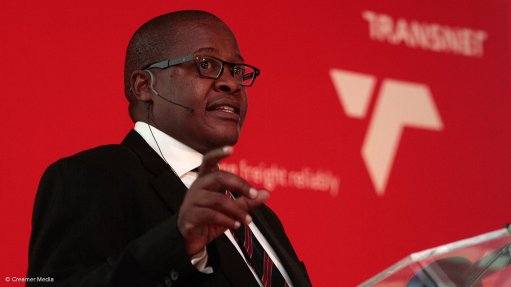
Transnet CEO Brian Molefe
Photo by: Duane Daws
South Africa’s Transnet Freight Rail (TFR) confirmed on Wednesday that it had purchased 34 second-hand diesel locomotives from rail company Aurizon, of Queensland, Australia, to augment its aging fleet ahead of the introduction of around 1 400 new locomotives by 2019.
CEO Siyabonga Gama refused to provide a purchase figure, saying only that each locomotive cost between A$180 000 and $230 000, depending on the condition of the unit.
The locomotives, which are about 20 years old, would be based in Bloemfontein and would be used by the general freight business to close a capacity gap that had arisen as a result of an 18-month delay to the ‘1064 acquisition programme’, which was concluded in March.
Under the R50-billion programme, General Electric South Africa Technologies would supply 233 diesel locomotives and CNR Rolling Stock South Africa would supply 232 diesel units. In addition, CSR Zhuzhou Electric Locomotive would supply 359 electric locomotives, while Bombardier Transportation South Africa would supply 240 electric locomotives.
Transnet also confirmed that it had retired 26 locomotives during the last six months, which was a major contributor to a R653-million impairment charge during the interim period to September.
Gama said TFR had locomotives that were over 48 years old, many of which would need to be scrapped. “So we bought some second-hand locomotives from Australia . . . to assist us in tiding us over in terms of capacity.”
CEO Brian Molefe indicated that an additional 86 electric and 19 diesel locomotives would be added to TFR’s fleet in 2015, but that the bulk of the 1064 locomotives would be introduced between 2016 and 2019.
He also defended the selection of foreign original equipment manufacturers (OEM), stressing that only 70 locomotives would be produced abroad, with the balance to be made at factories in Gauteng and KwaZulu-Natal.
Molefe dismissed the National Union of Metalworkers of South Africa’s (Numsa’s) demand that the contracts be reviewed, owing to the exclusion of CTLE (previously Union Carriage & Wagon) from the winning consortiums.
Numsa argue that CTLE had a proven record in the railways sector and that its exclusion was placing 250 jobs at risk.
Molefe said CTLE, in which the Industrial Development Corporation and the Numsa Investment Company have holdings, had tendered to do work with two of the successful suppliers.
Transnet had also moved to match other South African suppliers to the winning OEMs in an effort to raise local content in the programme.
“Numsa marched [on October 16] and said we should have bought the locomotives from South Africa. It’s a preposterous demand, because there is no original equipment manufacturer in South Africa and we think that the arrangement we have made is the best arrangement.”